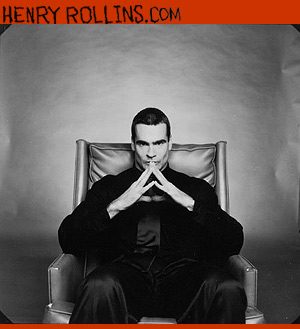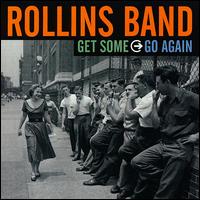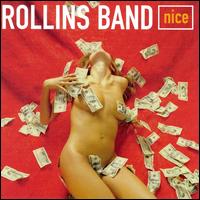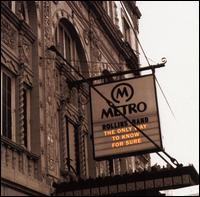
A FIRESIDE
CHAT WITH HENRY ROLLINS
I just saw Jackass (stunts were done by professionals) and was pleased
to see that along with Brad Pitt, Henry Rollins is a fan of Party Boy.
Heat is a classic and outside of the Godfather series (Part III was a
misunderstood and Francis needed the money), the Michael Mann film has
been on heavy rotation in my DVD player. Henry Rollins was in Heat. Had
a nice role. Got thrown through a glass sliding door by Al Pacino. That
kind of thing is a cocktail party gem. I have heard him described as a
renaissance man and moreover, Rollins seems to dig jazz, having signed
a little known Matt Shipp to his label. I just think Rollins knows what
he wants, who he is, and doesn't jerk people around. Perhaps that is renaissance
these days. But I will let the man tell you, unedited and in his own words
(and like the before mentioned Jackass, this interview was too done by
professionals).
FRED JUNG: Let's start from the beginning.
HENRY ROLLINS: Well, as far as playing music, it was punk rock that allowed
me to get up on stage, with the ethic of if you have intent, you can do.
You don't need to sit with a guitar for twelve years and get your chops
together. If you've got a song in your heart, you're part way there, which
helps a non-musical person like me get up there because I had all the
intent in the world and no talent. So I went up there with my intent and
I am still using that as my main propellant. So I started doing gigs in
1980 and by '81, I had joined an LA band called Black Flag and I was in
Black Flag, touring internationally and recording albums from '81 to '86
and '87, after the Black Flag guys had broken up, I formed my own band,
which I had ever since.
FJ: You grew up in our nation's capitol, what was the musical landscape
of Washington DC?
HENRY ROLLINS: Musically, you had a very rich eco-system. You had the
Bad Brains. You had all the Dischord bands, Ian Mackaye, Minor Threats,
all that stuff, tons of good bands and a really good local scene. There
were always cool gigs and it's the capitol city of America, so international
touring bands and national touring bands were coming through, everything
from Black Flag, to the Damned, the UK bands, Gang of Four, The Buzzcocks,
The Clash, and so we saw all that stuff. The Cramps would come down from
New York or The Circle Jerks would come out from LA or Flipper from San
Francisco with the Dead Kennedys. So you got all the cool punk rockers
and the local scene was very rich too. So there was no shortage of innovative
musicians and cool bands coming through on a pretty regular basis.
FJ: How did you meet the guys from Black Flag?
HENRY ROLLINS: They were a very small band at the time and they would
come through DC. They would stay at Ian Mackaye's mom's house, sleeping
on the floor. I lived down the street from Ian and we just hung out with
them. Ian called SST (record label), this was years ago, 1980, and said,
"Hey, you guys are coming through. I'm Ian Mackaye. I have Dischord
Records. I was in Minor Threat. Do you guys need a place to stay?"
They were like, "Fuck yeah!" And so, "Great, here's my
number. Call me when you get to town." We even drove up to New York
to see them before they even played DC. So we met them in New York and
the next day, boom, they're down in DC and we hung out and became friends.
FJ: How long have you been writing poetry?
HENRY ROLLINS: I've been writing stuff since the Seventies. Writing for
me has always been an outlet and you do it solo. It is something you can
do alone and the way I live there is a lot of time alone, a lot of travel,
a lot of miles. And so the writing has always been there as a friend.
I do a lot of journal writing, a lot of essay stuff, and a lot of writing
in general. I'm geared towards that and my lifestyle has me alone a lot
getting to the next place.
FJ: Ever get lonely?
HENRY ROLLINS: Yes, but not for people. There is just a general loneliness
that sometimes accompanies me with travel. Thomas Wolfe, the great writer,
who died in 1937 (September 15, 1938), really captured it in his writing
very well. If you read his first two novels, he talks about the loneliness
of the American and the American night and the loneliness inherent in
the American continent. It is kind of more on that level, more than missing
a female or something like that.
FJ: Would you say by your own admission then you are an introvert or introspective?
HENRY ROLLINS: Introspective, but very extroverted.
FJ: That must be fuel to go out on stage and express that angst or loneliness
and connect with an audience?
HENRY ROLLINS: Absolutely, sure. The fact that I can't wait to go out
there and show them what I can do. Yeah, that is not an introverted mindset.
FJ: How many books have you written and published?
HENRY ROLLINS: Twelve or thirteen or something like that. Well, I own
the company. I sleep with the owner and President every night, so really,
no one is telling me no. So it is not like a big achievement. It is my
machine so I could put out my grocery list if I really wanted to.
FJ: With all that which you have done thus far, do you consider yourself
to be a renaissance man?
HENRY ROLLINS: Nah, just someone who is interested in a lot of stuff.
Like Man Ray, the great artist, he never really considered himself an
artist, but he sculpted and he painted and he directed film and he wrote
and he sketched and he did all this stuff. He's always been a hero to
me because he was just went after it without a whole lot of presence.
You see the stuff he does, it is amazing. And when you see him on film
being interviewed, I swear to God, he is like the guy who would come and
haul away the garbage from the art studio the next day. You can't believe
that this guy is Man Ray. It is like whenever you see Henry Miller in
interviews. You read these beautiful books and he sounds like this New
York cab driver. And Miller painted. He wrote. He traveled. He did all
this stuff, but that's who he was. He did all this stuff, but he never
said, "I am the writer." That is kind of where I'm coming from.
FJ: When did you get your SAG (Screen Actors Guild) card?
HENRY ROLLINS: Ninety-one or two. I forget. The first movie I did was
in the Eighties. I did a film in '88, a feature length UCLA student film
called, No, Not One. And then after that, I guess it was The Chase with
Charlie Sheen and from there, one to three films a year. Hollywood isn't
really pursuing me, nor am I really pursuing it. I'm not God's gift to
acting. Every once and a while, I do a movie. It's not on the top of my
priority list, but it is fun once and a while.
FJ: You had screen time in one of my favorites, Michael Mann's Heat.
HENRY ROLLINS: Oh, yeah. I had a small part in that. That was fun. I went
and auditioned for a part and they changed the makeup of the guy and they
said, "Now, this guy is like ten years older than you, so we can't
use you for that, but from the audition you did, we like you and here's
a smaller part and you can have it with no audition. We just think that
you can do this. It is nothing to really write home about, but it is yours
if you want it." I looked it over and said, "Yeah, sure, I would
love to do this." It was kind of a minor role.
FJ: Minor, you get thrown through a sliding glass door by Al Pacino.
HENRY ROLLINS: It was fun. It was a couple of nights of work with Pacino
and that was very cool. I had lunch with the man and that was quite the
thrill.
FJ: Even in the midst of all this, you still have managed to stay honest
to your music.
HENRY ROLLINS: That is what you've got to do because music is the master.
I learned that a long time ago. Music is the pure source and the job of
the musician to me is to go to the mountain and not break anything. The
only thing that screws up music is musicians. Music is perfect. It is
a perfect state. The only thing that screws it up is people's ego when
they smear it. A guy like John Coltrane let the music come through him.
He got out of the way of the music, so the purity could come through.
Hence, that is why those records are so damn good. He was a pure vector.
To me, he is the purist musician that I have ever heard.
FJ: Favorite Trane record?
HENRY ROLLINS: Either The John Coltrane Quartet Plays or A Love Supreme
or Transition or Stellar Regions, I really like, that posthumous release
that they just put out like three years ago, the one that Alice found
in her closet. It is like the last ever session and that is so beautiful.
What a record! He was just on the brink of another breakthrough. Like
the next year would have been so insane. It makes me so mad to hear that
record. You hear him about to step to the next thing and he gets cut short.
Like Hendrix, he is turning this amazing corner and you don't get to hear
the next installment. To me, the most interesting stuff that either of
those guys did was like their last shit. It is so frustrating to hear
part two. It is like, "Awe, come on!" I'm always like playing
the records before and looking for clues to where he could have gone.
To me, if you can keep in your mind that music is master and you are just
there to serve it, then you will never master it. That is a way to keep
yourself humble in the face of music. Guys like Al Green, they serve the
music. He is reverent in the face of music. That is why he is still vital.
He knows who the boss is. John Lee Hooker knows that the blues is a master
and that he is only a servant.
FJ: Having said that, are you still a student of the music?
HENRY ROLLINS: Yeah, of course, still learning and falling deeper in love
with my job as a servant every year.
FJ: What is your job?
HENRY ROLLINS: My job is to be honest and the job of the artist in my
opinion is to go deep in and keep pulling it out, even when it hurts,
sometimes especially when it hurts. The real thing, in my opinion, is
not for the fragile.
FJ: What is the key? Inner strength?
HENRY ROLLINS: Or just really into it. I don't consider myself particularly
strong, but I am very committed to my thing. I think a lot of people business
aren't into it fully. I may be too hard-lined and you can laugh me off,
but I really don't believe that you can have wife and a kid and make the
music vital. Either be a dad and a parent and stay at home and be a righteous
parent or be the musician. If you are going to be rock and roll dad, imagine
if Lenny (Lenny Kravitz) a kid. What kind of dad would he be? He's not
around. The guy is always on tour. I always see him somewhere else than
were he lives. And what kind of dad is that? The kids wouldn't even know
him, so he wouldn't be doing the job there. But what if he stayed home
all the time and played daddy, what would the music be like? I can't see
it having the same edge, so either you choose and if you choose the music,
to me, it is almost like living in a monastery. I've chosen the art world.
I have no plans for kids. I love kids, but I've got no plans for them.
I have no plans for marriage. I have a wife. It is the music. I have a
girlfriend, but she knows where I'm at.
FJ: Any regrets with your choice?
HENRY ROLLINS: No, I don't allow myself regret. If I did it, then tell
me what my punishment is. If you did it, you did it. So own up and pay
the man what you owe him and limp on.
FJ: Let's touch on the new album on Dreamworks, Get Some Go Again. It
is a real stripped down and straightforward recording.
HENRY ROLLINS: Thanks, well, I like it. I enjoy playing the songs live
night to night. We're seventy-four shows into the tour and I can't wait
to play tomorrow night. We've got band practice tonight. We've had like
four whole days off. We got here from Australia and one of the guys in
the band said, "Man, four days without playing, we better practice
before the show." I said, "You're right." So we're going
to practice tonight and we're back on tour tomorrow.
FJ: How long have you been on the road?
HENRY ROLLINS: Since last summer.
FJ: Must get grueling.
HENRY ROLLINS:
This is my twentieth year. Home for three weeks is grueling. Going to
the grocery store every eight days or whatever it is, that's grueling.
LA traffic and meeting, that is enough to make me want to break shit.
But no sleep and a gig and eight hundred miles, oh, I'll take it.
FJ: So the domestic life is not for you.
HENRY ROLLINS: Not now. But that can change. I've got a pretty nice place
to live. It is not a castle. It holds a person and it is cool. All my
books are in there, my records, and I do like to read the books and listen
to the music. I've played a lot of music in the last day and a half since
I got home, stuff I just wanted to catch up on. For now, the world is
very interesting to me. I really love to get out there in the world and
see it. I like Europe. I like Australia. I like Africa. To set up all
these iron barriers for one's self has not served me well in the past,
so I can never say that I'm never going to do this because I will probably
be doing exactly that in a year. But I will be the first one to go, "Who's
the asshole?" For now, I am having a great time on the road. The
world is fascinating to me. Up the road from now, I don't know, Fred.
I'm rocking out here.
FJ: What fascinates you about the world we live in?
HENRY ROLLINS: All the people, all the places, the different cultures,
the different music, like to go to India and every moment to moment have
your mind blown. Like every five minutes, you see something that you didn't
know existed, to see something so alien and beautiful. That is walking
around Calcutta for me, just walking the streets of those cities. It is
just like forget it. Watching three old men on funeral priors burning
in the afternoon. Standing there smelling burning flesh and scented wood
and then lookover and there is theGanges River and people are bathing
in it and you are like, "What the fuck?" Six dead bodies lying
on the ground, waiting to be burned and then you go eat dinner. That doesn't
happen to me in San Francisco. Now, San Francisco, that city has its own
magic, which I love, but to be home when I could be out shaking hands
with a Masai village elder, which I've done, why be home when the world
is there saying, come play with me. That for now, is super interesting
to me. I love the Nile. I have been on the Nile. I like the Ganges. I
live rivers. I like these countries. I went to see the Sphinx. Before
that I was in LA and before that I was in Jerusalem. Two days before Jerusalem,
I was in fucking Moscow. This is the shit to me. That's the way to do
it. I'm doing it the way I think it should be done for now. You never
know, Fred. I hit fifty, ten years from now and want to sit down and catch
my breath, well, I imagine there is time up the road for that. For now,
while my knees still work, I want to go get some.
FJ: What are you listening to?
HENRY ROLLINS: This morning, I listened to a beautiful scratchless copy
of Hawkwind's Doremi Fasol Latido. And last night was everything from
a really nice copy of White Light, White Heat, White Trash (Social Distortion)
to an old folk guy from Mississippi called Cat Iron. I listened to Elliot
Smith, Cat Stevens, and some other people. I got a lot of listening done
yesterday, just a bunch of LPs that I found in Australia.
FJ: Are you a record geek?
HENRY ROLLINS: Oh, yeah. Are you kidding? I have been since I was fourteen.
I have a couple of rooms full of stuff, many CDs, many LPs, two inch tape,
quarter inch tape, DATs, boxes of cassettes from the making of records.
FJ: Are you political?
HENRY ROLLINS: I'm an American. I'm thoroughly political.
FJ: What are some issues that remain close to your heart?
HENRY ROLLINS: The same shit that always does, homophobia, misogyny, racism,
and the gross distribution of wealth in this country that keeps us where
we are.
FJ: Quoting you, "The more you own, the more it owns you."
HENRY ROLLINS: Yeah, which is a play off Nietzsche, who said, "that
which you possess is that which possesses you," which is probably
me paraphrasing Nietzsche. I don't know if that is his, but that is where
I read it. I think it goes right along with, "he who looks into the
abyss must also know that the abyss looks into him." I found out
what that meant a few years ago and it is really heavy. I got my version
of that reality. But, yeah, all that stuff you own also owns you. When
I was really broke and I had about three feet of vinyl to my name, three
boxes of books, and a gym's bag worth of clothes, I could be out of any
place I lived in, in the truck of a car in an hour. And if I lost all
of it, the tapes were pretty rare, but the rest of it, fuck it. I can
always find another copy of Black Spring by Miller. So I didn't really
have a lot of concerns. This guy is going to sue you, "Fine, give
him everything, all thirty-five dollars." Or, "Your place burned
down." "Well, my home burned down. You mean, the abandoned van
that I have been living in, in the liquor store parking lot. I knew that
was going to happen." So I really didn't have that many attachments.
Now, I'm a home owner and I have insurance on that place and there is
stuff in the house and when I'm gone, my girlfriend lives in there to
make sure that it stays OK. And there is a guy who comes and clips the
hedge and there is all these people involved. I have stuff, not a lot,
but I've got stuff. Then you start getting all these new phone numbers
for people to help you maintain the stuff. Like the plumber is coming
tomorrow. He's got to fix the tub, which is now leaking through the ceiling
and so plaster boy is going to come in too. That is a bunch of money that
I've got to spend because a pipe leaks because I have a pipe. It has a
hole in it. I own that pipe. I own the hole in it too and soon, I'll own
a whole bunch of new plaster put expertly in place for some evil amount
of money per hour. So that which you possess is also that which possesses
you.
FJ: That is a timely comment for the enormous amount of wealth that is
being generated via the internet and stock market in recent years.
HENRY ROLLINS: Sure, well, you have a little bit of people owning a lot
of stuff and a lot of the control of the country. You have a bunch of
companies eating each other up like amebas and so you will have a thing
where ninety-eight percent of the stuff in the country is owned by two
percent of the people. And that is Rio de Janeiro. It is a palace or you
have got a bag full of glue in your face. That where I see it potentially
going. I'm just hoping that the new cyber millionaires, and I have read
reports that confirm this, that they seem to be a friendlier bunch than
the people who spawned them. The guys like the Yahoo guys, apparently
they contribute a lot of money from everything from flood relief to rain
forest stuff and they seem to not want every available dollar like a Trump
guy. I am hoping that the newer rich will be a more tolerant, eco-friendly,
more tolerant god because the Eighties Reagan gods were very mean. We're
all paying the price. It has dispossessed the homeless and the rapidly
ever shrinking middle class. There is a whole new eco-system and a whole
new Darwinian jungle in the world now. You evolve by being middle class
and groping upwards, pulling yourself out of the mud, losing your gills,
and putting on a suit. Now, college boy is trading his baseball cards
and stocks online. Everybody is in, except for the poor, who are kind
of far behind the technological wave ten years ago and now are falling
fast per second, per second because technology is going at lightning speed.
I have a book company. Even nine to fifteen months we are replacing the
computers around here. I can afford it. What is a poor guys going to do
when he doesn't know what a modem is and it is the only way he is going
to get a blood transfusion. So it is going to get pretty sci-fi before
it gets back to analog. That is my prediction. Young people are strong
and realize that their strength lies in their tolerance. That is where
we are going to see who is the man and who is the coward. To me, I don't
care about your strength unless it is shown through your tolerance.
FJ: You once remarked on how "the best revenge is to survive,"
revenge is at hand for Henry Rollins.
HENRY ROLLINS: Yes, well, I survived my parents and I survived my own
bullshit pretty well. It is a constant battle, but I am winning more than
losing.
Fred Jung is the Editor-In-Chief and is a pit stop on the Amazing Race.
Comments? Email Him



